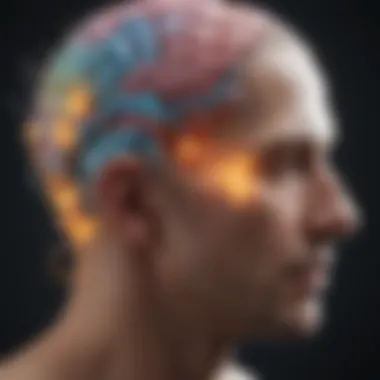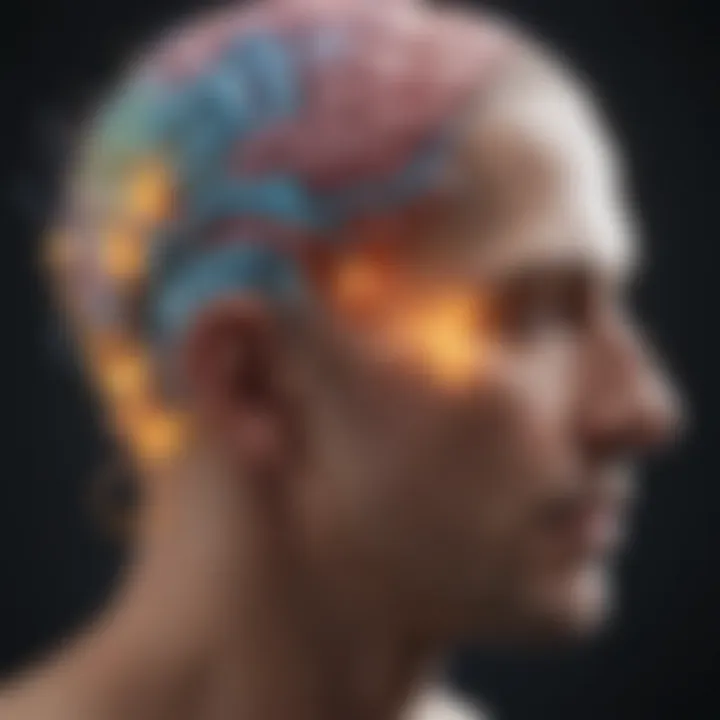Unraveling the Intricacies of Consciousness: A Comprehensive Exploration


Research Overview
A for Tag Research Overview strives to delve into a complex domain, the treacherous terrains of comprehending the intricate cogitations of consciousness. This segment will introduce readers to the labyrinthine landscape of consciousness mechanisms, setting the stage for a thorough exploration. Previous investigations in this realm will be succinctly summarized, providing a groundwork for subsequent discussions. The quintessential methodologies employed in deciphering the enigma of consciousness will be elucidated, offering readers a glimpse into the scientific rigor guiding this intellectual pursuit.
Health Implications
Given the enigmatic nature of consciousness, its comprehension holds profound implications for human health and functioning. This section will scrutinize how unraveling the mechanisms of consciousness can potentially revolutionize health paradigms. By delving into the potential benefits and risks unearthed by this research, readers will gain insights into the transformative power of understanding consciousness dynamics. Practical examples detailing the integration of these findings into daily life scenarios will illustrate the tangible impact on health and well-being.
Well-being Strategies
Navigating the complexities of consciousness elucidates not only intellectual marvels but also pragmatic strategies for enhancing well-being. Drawing from the research findings, practical tips and actionable strategies will be presented to empower readers in optimizing their mental and physical health. Insights gathered from the research will be translated into actionable advice, aiding individuals in implementing positive changes that foster holistic well-being. Real-world anecdotes and case studies will lend credibility to the strategies, resonating with readers seeking tangible transformations.
Expert Insights
Unveiling the intricate tapestry of consciousness mechanisms warrants an examination of expert perspectives in this field of inquiry. Through a meticulously curated analysis, this section will showcase the diverse opinions and interpretations offered by leading experts. A dynamic Q&A session with a prominent figure in the realm of consciousness studies will provide readers with a personalized encounter with the nuances of this captivating subject, enriching their understanding with expert elucidations.
Introduction
This article embarks on the journey of exploring the intricate mechanisms of consciousness, unraveling the enigmatic nature of this fundamental aspect of human existence. In a world where understanding the workings of the mind is increasingly crucial, delving into the depths of consciousness opens a realm of knowledge that impacts various disciplines from neuroscience to philosophy. Through a multi-faceted approach, we aim to shed light on the neural, cognitive, and philosophical facets that contribute to our comprehension of consciousness.
From ancient contemplations to modern scientific breakthroughs, the concept of consciousness has gripped the minds of thinkers, researchers, and scholars across centuries. As we navigate through the pages of history to contemporary theories, the evolution of human thought on consciousness becomes apparent. The Introduction sets the stage for a deep dive into conscious experience, shedding light on its complexities and implications for our understanding of self and existence.
In this section, we will highlight the key themes that will be explored in detail throughout the article. By outlining the critical points and providing a roadmap for the reader, we aim to offer a structured approach to comprehending the mechanisms of consciousness. The significance of the Introduction lies in its ability to orient the audience towards the overarching goal of unraveling the mysteries of consciousness with a blend of scientific rigor and philosophical introspection.
Defining Consciousness
Conscious Experience vs. Unconscious Processes
Conscious experience versus unconscious processes forms a key dichotomy in the realm of consciousness studies. Conscious experience encapsulates our subjective awareness of thoughts, emotions, and sensations, providing a window into our conscious minds. On the other hand, unconscious processes operate beneath the surface, influencing our behavior and cognitive functions without our explicit awareness. Delving into this distinction sheds light on how our minds operate on multiple levels, blending conscious perception with subconscious information processing to construct our reality.


The Role of Awareness
The role of awareness serves as a cornerstone in the edifice of consciousness exploration. Awareness acts as a guiding force that directs our attention towards external stimuli and internal mental states. By examining the mechanisms behind awareness, we gain insight into how our minds filter and interpret information, shaping our conscious experience. Understanding the role of awareness illuminates the processes that underpin our ability to perceive, learn, and adapt to the ever-changing environment around us.
Historical Perspectives on Consciousness
Ancient Views
Ancient views on consciousness offer a rich tapestry of philosophical and metaphysical thought from civilizations past. These perspectives, spanning across cultures and epochs, provide unique insights into how early societies conceptualized the nature of consciousness. By delving into ancient views, we unearth the roots of our modern understanding of the mind, exploring the enduring questions that have captivated thinkers throughout history.
Modern Interpretations
Modern interpretations of consciousness build upon the foundation laid by ancient wisdom, incorporating scientific advancements and interdisciplinary approaches to unravel its complexities. These contemporary perspectives employ cutting-edge research from neuroscience, psychology, and philosophy to offer new frameworks for understanding consciousness. By examining modern interpretations, we gain a fresh perspective on age-old questions, melding tradition with innovation to forge a comprehensive understanding of consciousness in the modern era.
Neuroscience of Consciousness
The segment on Neuroscience of Consciousness within the purview of this informative document serves as a crucial juncture for elucidating the intricate workings of the human mind. Delving into the complexities of brain functions and neural activities, this section aims to shed light on the fundamental mechanisms that underlie consciousness. By exploring the intersection between neurological processes and conscious awareness, we aim to provide a comprehensive overview of how the brain gives rise to subjective experience and self-awareness. Through a meticulous examination of neuronal structures and information processing, this exploration into the neuroscience of consciousness offers a profound understanding of the biological basis of human cognition and perception.
Neural Correlates of Consciousness
In the exploration of consciousness, understanding the neural correlates is paramount in deciphering how our brain activity corresponds to our conscious experiences. The concept of neural correlates entails identifying specific brain regions and patterns of neural activity that accompany different states of consciousness. By analyzing the neural underpinnings of subjective experiences such as thoughts, emotions, and sensations, researchers can unravel the intricate relationship between brain functions and conscious awareness. This section delves into the intricate neural mechanisms responsible for generating consciousness, providing invaluable insights into the interplay between neural dynamics and the richness of human experience.
Conscious vs. Unconscious Brain Activity
Distinguishing between conscious and unconscious brain activity is crucial in unraveling the enigma of human consciousness. While conscious brain activity is associated with deliberate thought processes and self-awareness, unconscious activities occur beneath the surface of awareness, influencing behavior and cognition. By delineating the neural processes underlying both conscious and unconscious mental states, this section elucidates the dual nature of human cognition. Exploring the neural substrates of conscious perception and the role of unconscious information processing, we gain a nuanced understanding of how the brain navigates between different levels of awareness and cognition.
The Global Workspace Theory
At the heart of contemporary neuroscience lies the influential Global Workspace Theory, a framework that endeavors to explain the dynamics of conscious processing in the brain. According to this theory, consciousness arises from the global dissemination of information among specialized brain networks, akin to information sharing in a global workspace. By examining how neural assemblies communicate and integrate information to produce coherent conscious experiences, researchers can probe the underlying mechanisms of attention, memory, and perception. This section delves into the foundational principles of the Global Workspace Theory, shedding light on the distributed nature of consciousness and the neural mechanisms that support unified cognitive functions.


Psychology of Consciousness
Self-Awareness and Metacognition
Self-awareness and metacognition stand as fundamental concepts within the Psychology of Consciousness. Self-awareness pertains to the ability of individuals to introspect and recognize their thoughts, emotions, and actions, leading to a deeper understanding of their inner workings. Metacognition, on the other hand, refers to the awareness and understanding of one's own thought processes, enabling individuals to monitor, control, and regulate their cognitive activities. These cognitive abilities not only enhance self-reflection but also facilitate decision-making, problem-solving, and goal achievement.
Altered States of Consciousness
Exploring altered states of consciousness within the domain of psychology unveils fascinating dimensions of human perception and experience. These states encompass various conditions such as meditative states, dreaming, and psychedelic experiences, offering unique insights into the diverse manifestations of consciousness.
Meditative States
Meditative states hold a prominent position in the exploration of altered consciousness, characterized by heightened attention, relaxation, and mindfulness. The practice of meditation fosters mental clarity, emotional equilibrium, and enhanced cognitive function, making it a valuable tool for introspection and self-improvement. The distinctive feature of meditative states lies in their ability to induce a state of focused awareness, promoting psychological well-being and stress reduction, thereby contributing significantly to the holistic understanding of consciousness.
Dreaming
The realm of dreaming provides a rich tapestry of experiences where the boundaries of reality blur, and the subconscious mind manifests vivid narratives and imagery. Dreams offer a window into the unconscious psyche, reflecting hidden desires, fears, and emotions that influence waking life. The intriguing aspect of dreaming lies in its capacity to integrate memories, emotions, and sensory perceptions into a surreal narrative, illustrating the intricate interplay between consciousness and the subconscious mind.
Psychedelic Experiences
Diving into psychedelic experiences unveils an unconventional exploration of altered states of consciousness, characterized by profound sensory distortions, heightened emotions, and expanded perceptions. These experiences challenge conventional reality constructs, opening the door to profound insights, introspection, and altered perspectives on the self and the universe. The unique feature of psychedelic experiences lies in their unparalleled capacity to dissolve ego boundaries, induce mystical experiences, and evoke profound spiritual insights, offering a provocative lens through which to examine the mysteries of consciousness.
Consciousness in Cognitive Processes
The intersection of consciousness with cognitive processes elucidates the intricate mechanisms underlying perception, attention, memory, and learning. By examining how consciousness influences cognitive functions, we gain a deeper understanding of how individuals process information, make decisions, and interact with their environment. This cognitive perspective provides valuable insights into the relationship between consciousness and cognition, highlighting the dynamic interplay between internal subjective experiences and external objective realities.
Philosophical Perspectives on Consciousness
In the realm of understanding consciousness, philosophical perspectives play a pivotal role in shaping our comprehension of this intricate phenomenon. Philosophy provides a unique lens through which we can ponder upon the nature of consciousness, debating concepts that extend beyond empirical observation. By delving into philosophical discourse on consciousness, we can explore fundamental questions about the origins and essence of conscious awareness. This section delves into various philosophical viewpoints that shed light on the complexities of consciousness and the mind.


Dualism vs. Monism
The age-old debate between dualism and monism stands at the forefront of philosophical inquiries into consciousness. Dualism posits the existence of two distinct substances - the mind and the body - with unique characteristics and properties. On the other hand, monism advocates for a unified perspective, suggesting that the mind and body are fundamentally inseparable. This dichotomy unveils contrasting ideologies regarding the relationship between mental phenomena and physical reality, challenging our understanding of consciousness and existence.
The Hard Problem of Consciousness
At the heart of the study of consciousness lies the enigmatic 'Hard Problem,' a concept introduced by philosopher David Chalmers. This conundrum encapsulates the mystery surrounding subjective experience and why it feels like something to be conscious. Addressing the Hard Problem involves delving into the essence of qualia, introspection, and the elusive nature of consciousness itself. Tackling this intricate issue requires a deep exploration of the inner workings of the mind and the philosophical implications of subjective awareness.
Panpsychism and Integrated Information Theory
Panpsychism and Integrated Information Theory represent contemporary philosophical perspectives that strive to elucidate the nature of consciousness. Panpsychism posits the idea that consciousness is a fundamental attribute present throughout the universe, permeating all entities regardless of complexity. In contrast, Integrated Information Theory proposes a mathematical framework for understanding consciousness, emphasizing the integration of information across neural networks. These theories offer unique insights into the holistic nature of consciousness, bridging the gap between philosophy and neuroscience in the quest for a comprehensive understanding of the mind.
Emerging Theories and Future Directions
In the realm of understanding consciousness, exploring emerging theories and future directions is of paramount importance. This section delves into the forefront of scientific and philosophical inquiry, pushing the boundaries of our current knowledge and opening avenues towards new insights. By examining the latest research and hypotheses surrounding consciousness, we pave the way for groundbreaking discoveries that may redefine our understanding of the mind. The exploration of emerging theories not only enhances our awareness of the complexities of consciousness but also offers glimpses into the potential evolution of our comprehension in the years to come.
Quantum Consciousness
Quantum consciousness is a captivating concept that merges the principles of quantum physics with the enigmatic nature of consciousness. Within this theoretical framework, the intricate interplay between quantum processes and cognitive phenomena is scrutinized, giving rise to intriguing speculations about the fundamental fabric of the mind. By investigating how quantum mechanics could influence conscious experiences, researchers aim to unravel the mysteries that have long eluded traditional scientific explanations. The discussion of quantum consciousness not only challenges conventional paradigms but also prompts us to reevaluate the very essence of awareness and perception.
Artificial Intelligence and Consciousness
The intersection of artificial intelligence and consciousness sparks profound debates about the limits of machine intelligence and the essence of human consciousness. Through the lens of AI, we confront questions regarding the possibility of creating conscious machines, the ethical implications of sentient artificial beings, and the parallels between artificial and human cognition. Delving into this subject sheds light on the potentials and pitfalls of advancing artificial intelligence, while also raising crucial inquiries about the nature of consciousness itself. The exploration of artificial intelligence and consciousness stands at the forefront of technological innovation and philosophical introspection, driving us to reexamine our understanding of cognition and sentience.
Ethical Implications of Consciousness Studies
While delving into the intricacies of consciousness, it is inevitable to address the ethical considerations that emerge from such profound inquiries into the mind. The ethical implications of consciousness studies encompass diverse aspects, including privacy concerns in neural research, the boundaries of cognitive enhancement, and the moral responsibilities associated with manipulating conscious experiences. By navigating through these ethical dilemmas, we not only safeguard the integrity of scientific exploration but also uphold the values of autonomy and integrity in understanding consciousness. Reflecting on the ethical dimensions of consciousness studies prompts us to tread carefully in this intellectual terrain and uphold ethical standards that preserve the dignity and rights of individuals involved in such research endeavors.
Conclusion
In concluding our deep dive into the intricacies of consciousness, we are faced with a culmination of insights that reshape our understanding of the human mind. This comprehensive exploration has not only unveiled the complexities of consciousness but has also shed light on the interconnected nature of neural processes, cognitive functions, and philosophical perspectives that underpin this enigmatic phenomenon. The significance of this concluding section lies in its ability to synthesize the vast array of information presented throughout the article, offering a cohesive narrative that encapsulates the essence of consciousness.
By delving into the key takeaways from each preceding section, we can decipher the relevance of consciousness in shaping our perception of reality and self-awareness. Through dissecting the neural correlates, the cognitive intricacies, and the philosophical quandaries surrounding consciousness, we gain a profound appreciation for the multifaceted nature of this topic. This concluding segment acts as a compass, directing us towards a deeper comprehension of our conscious experiences and the mechanisms that dictate our cognitive functions.
Moreover, the benefits of dedicating attention to understanding consciousness extend beyond theoretical contemplation. By unraveling the enigma of consciousness, we pave the way for revolutionary advancements in fields such as neuroscience, psychology, and artificial intelligence. The considerations raised in this conclusion prompt us to reflect on the ethical implications of manipulating consciousness, the potential integration of artificial intelligence with conscious systems, and the philosophical paradoxes that challenge our current understanding of the mind.



